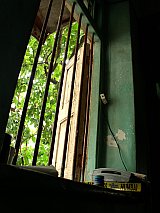 Screenwriting is fun. It’s also frustrating as hell, and I haven’t quite learned to do it at a stretch like regular fiction writing. Right now Samir and I average around five pages of text (equivalent to about 5 minutes of screen-time in the page-a-minute format) before we have to get off the chair and just walk around the house for 5 minutes.
Screenwriting is fun. It’s also frustrating as hell, and I haven’t quite learned to do it at a stretch like regular fiction writing. Right now Samir and I average around five pages of text (equivalent to about 5 minutes of screen-time in the page-a-minute format) before we have to get off the chair and just walk around the house for 5 minutes.
The screenwriting we’re doing now involves many firsts. Number One, it’s the first time we’re screenwriting. One day we said “Okay” and after the plot was outlined we started.
It scares the living crap out of you. No matter how many books you read on the subject nothing can quite prepare you for your first hour of screen-writing. Add in the fact that we had never, ever written in this format before — not even a ten second animation script — and the prospect of writing even a 25 minute episode makes you question your sanity quite a bit. Writing a 2 hour movie is a nightmare.
 The format of screenwriting is pretty tried and tested at this point, and since most books outline the system preferred by American movie studios, there’s a lengthy list of guidelines to the format. Our first draft was slavish to this format, but we’ve deviated a bit, both because of the subject matter involved as well as the fact that *looks around* we’re not American.
The format of screenwriting is pretty tried and tested at this point, and since most books outline the system preferred by American movie studios, there’s a lengthy list of guidelines to the format. Our first draft was slavish to this format, but we’ve deviated a bit, both because of the subject matter involved as well as the fact that *looks around* we’re not American.
There is a tendency in your first draft to be very, very dry with your descriptions, especially if you know that the screenplay is intended for someone else (i.e you aren’t producing it yourself). Style consciously needs to be kept in check (so pretty much everything I learned writing Savant went out the window). This is supposed to be easier to pitch to a studio, so that the director can read it and put in the style himself. Writer style Bad, Director style Good, or something. Since we aren’t really pitching this through the traditional American studio system (hell, if they read the script in America I’ll probably be put on the Most Wanted Terrorist list) we decided to loosen up a little and get some style in. Hopefully said style and mood will percolate somewhat to the eventual director. With stuff I know I’ll be doing myself I tend to be much more descriptive and, paradoxically, much more abstract, since I can tell myself things in two words that I’d need whole paragraphs to explain properly. Terms like “Ping Moment,” “Amit Reaction” and “Duu Kyaa? Expression” are common.
I have to thank Warren Ellis for this change. Some time ago he put a link up to extracts from his comic-book scripts, and I was surprised at how, compared to them, the saleable American Movie Script seemed like a stripped carcass. Comic scripts are more intimate, more hands on, more conversational. I love them. And so the way we script changed somewhat. It’s still a far cry from the level of detail and mood in a comic script, but close enough. Don’t want to scare everyone away.
One of the first errors made in screenwriting is the over-use of the Present Continuous Tense. People are always waiting and drinking and walking while talking and shooting and sitting. I usually end up going through the script again and changing — damn, there I am doing it again. I go through the script and change things to make them more succinct.
Vishal types away on the keyboard. He leans back and rubs the pain in his upper back. A grimace stretches across his face and all the way down his spine. The weight of the world shifts. He continues typing.
Just because it’s a screenplay doesn’t mean you can get away with Talking Head syndrome, though. It may be easy to say, “Oh, the actors will take care of it,” but do you really want some sweaty man in a track-suit gesturing with his hands when you distinctly imagined the character keeping his palms flat by his side, neck rocking left and right intermittently?
 Firsts, Number Two; this is the first time I’m collaborating with Samir on writing. He doesn’t like to type. Neither do I, but I do okay. He writes good dialogue, I’m all thumbs. He’s much more evil and funny than I am.
Firsts, Number Two; this is the first time I’m collaborating with Samir on writing. He doesn’t like to type. Neither do I, but I do okay. He writes good dialogue, I’m all thumbs. He’s much more evil and funny than I am.
Number three; this is the first time we’re writing Hindi. It’s more fun than you would believe. We’re still writing in the English language (we’re more comfortable in it and work faster, besides, working with Hindi fonts on a computer is quite literally like learning the language anew), but dialogue is in Hindi. Dialogue was and is my biggest worry. I can hack decent English dialogue, but Hindi is another matter entirely (this is the reason all Hindi movies have separate “Screenplay” and “Dialogue” credits). Right now the dialogue is pretty good. It’s realistic enough, funny enough, and it gets the job done without sounding like some kind of 17th century Urdu court transcript.
This is one of the main problems with Hindi movies, especially old ones. Since most of the dialogue writers were and are Urdu lyric writers or urdu writers of some sort, their dialogues would suddenly go from (the English equivalent of) “Dude! Her ass is totally hot!” to “Mine Sir hath brought a mountain — heavy with stones and grasses verdant — of Shame(!) upon mine family, and verily shall I avenge them and their unborn sons with swift and painful work of hand and blade!”
The above is not an exaggeration. Things like that still happen (see the climax of Kuch Naa Kaho). Us being about as proficient in Urdu as any other two Good Kaafir Hindu boys, well, our dialogue is okay. It’s contemporary without being to hip (i.e. we haven’t degenerated to starting and ending every other line with “yaar” like some films *cough*Darna Mana Hai*cough*), and it isn’t flowery. Sometimes we even manage a good dialogue joke.
 This is also the first time, ever, that I’m not writing speculative fiction. No magic, no warp drives. Despite this the scripts are getting more surreal by the page, but that is only because Samir and my own weirdness multiply by a factor or 34.8 when brought together. There’s some strange shit happening here, folks. I didn’t even think I was capable of such stuff.
This is also the first time, ever, that I’m not writing speculative fiction. No magic, no warp drives. Despite this the scripts are getting more surreal by the page, but that is only because Samir and my own weirdness multiply by a factor or 34.8 when brought together. There’s some strange shit happening here, folks. I didn’t even think I was capable of such stuff.
Even if it wasn’t a comedy, even if it wasn’t in Hindi, it would be as strange. You could tell me to write a Pakistani Family Drama and I would make it strange… okay, so if I wrote a Pakistani Family Drama it would not be a Pakistani Family Drama because nothing — nothing — in the universe could make me write something as depressing as most Pakistani Family Dramas. If I write a Pakistani Family Drama half the Pakistani audience will die of spontaneous joy. The rest will call for a fatwa.
And no, I’m not giving the script away. Nor am I going to give the title away. I’ll just say that it involves quite a few B.E.S.T. Buses.
Vishal



